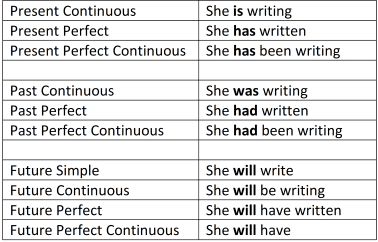Auxiliary Verbs
Auxiliary verbs are also known as helping verbs because they help to form the different verb tenses and moods in English. The most common auxiliary verbs are:
to be to have to do modal verbs
Examples of the auxiliary verbs being used to form verb tenses.
AUXILIARY VERBS & CONTRACTED FORMS In both spoken and written English auxiliaries are often contracted.
TO BE Present Tense
affirmative contracted negative contracted I am I’m I am not I'm not you are you’re you are not you're not / you aren't he is he’s he is not he's not / he isn't she is she’s she is not she's not / she isn't it is it’s it is not it's not / it isn't we are we’re we are not we’re not / we aren't they are they’re they are not they're not / they aren't
Past Tense
affirmative negative contracted I was I was not I wasn’t you were you were not you weren’t he/she/it was he/she/it was not he/she/it wasn’t we were we were not we weren’t you were you were not you weren’t they were they were not they weren’t
TO HAVE Present Tense
affirmative contracted negative contracted I have I’ve I have not I’ve not / I haven’t you have you’ve you have not you’ve not / you haven’t he has he’s he has not he’s not / he hasn’t she has she’s she has not she’s not / she hasn’t it has it’s it has not it’s not / it hasn’t we have we’ve we have not we’ve not / we haven’t you have you’ve you have not you’ve not / you haven’t they have they’ve they have not they’ve not / they haven’t
Past Tense
affirmative contracted negative contracted I had I’d I had not I’d not / I hadn’t you had you’d you had not you’d not / you hadn’t he had he’d he had not he’d not / he hadn’t she had she’d she had not she’d not / she hadn’t it had it’d it had not it’d not / it hadn’t we had we’d we had not we’d not / we hadn’t you had you’d you had not you’d not / you hadn’t they had they’d they had not they’d not / they hadn’t
TO DO Present Tense
affirmative negative contracted I do I do not I don’t you do you do not you don’t he/she/it does he/she/it does not he/she/it doesn’t we do we do not we don’t you do you do not you don’t they do they do not they don’t
Past Tense
affirmative negative contracted I did I did not I didn’t you did you did not you didn’t he/she/it did he/she/it did not he/she/it didn’t we did we did not we didn’t you did you did not you didn’t they did they did not they didn’t
MODAL VERBS affirmative negative contracted can cannot can’t could could not couldn’t may may not - might might not mightn’t shall shall not shan’t should should not shouldn’t will* will not won’t would* would not wouldn’t must must not mustn’t ought to ought not oughtn’t
*only will and would have other contracted forms :
will affirmative contracted negative contracted I will I’ll I will not I won’t you will you’ll you will not you won’t he will he’ll he will not he won’t she will she’ll she will not she won’t it will it’ll it will not it won’t we will we’ll we will not we won’t you will you'll you will not you won't they will they’ll they will not they won’t
would affirmative contracted negative contracted I would I’d I would not I wouldn’t you would you’d you would not you wouldn’t he would he’d he would not he wouldn’t she would she’d she would not she wouldn’t it would it’d it would not it wouldn’t we would we’d we would not we wouldn’t you would you'd you would not you wouldn't they would they’d they would not they wouldn’t
More on Modal Verbs
NOTE ON CONTRACTED VERBS
RELATED TOPICS
